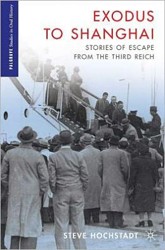There was still a place for some Jewish refugees from Nazi Germany in 1938, and it was virtually the only place: the open city of Shanghai, to which some 20,000 German and Austrian Jews, plus a few thousand from other countries, found their way. To survive in this city of extreme poverty and dazzling wealth, these accomplished artists and intellectuals were forced to forsake the skilled and talented occupations that had brought them comfort and success in Europe. Life in the Shanghai slums and the ghetto-like quarter, Hongku, required submission to the reality of working in menial jobs and the many indignities that forced subservience can inflict.
Playing out against this background are the stories of several richly portrayed refugees, whose striking lives are picked up as they prepare to leave Germany, through their flight to China, their desperate lives there, and their final departure at the war’s end. While these men and women strive to maintain their civility and humanity, they brush up against the Japanese warriors who have invaded China, a Nazi advance guard situated there, and Chinese agitators. Masterfully depicted subplots portray the tension, intrigue, and infamy that arose from the strife among these various forces.
In a concluding note, Wagenstein describes the origin of his characters in the real people whose lives inhabit this novel. This is a work that brings a new and moving dimension to our knowledge of the Holocaust.



